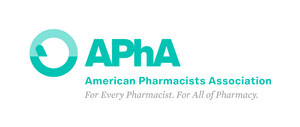Services may include immunizations, over-the-counter medication counseling and advice on good health practices
WASHINGTON, Sept. 27, 2012 /PRNewswire-USNewswire/ -- With flu season upon us, and reports of increases in illnesses like pertussis (whooping cough) in the news, the American Pharmacists Association (APhA) would like to remind the public that normal prevention methods and communication with health care providers, such as pharmacists and physicians, can help you and your family stay healthy and avoid complications.
(Logo: http://photos.prnewswire.com/prnh/20100820/APHALOGO-a)
Following good health practices is one of the most effective ways to prevent the spread of most illnesses. Cover your mouth and nose during a cough or sneeze, avoid touching the eyes, nose or mouth and wash your hands frequently. Maintain your appointments with all healthcare providers and talk with your pharmacist and physician about your vaccination needs. Other good health practices to follow include using alcohol based hand sanitizer, getting plenty of regular sleep and avoiding work, school or other places of close contact when you are sick.
Influenza (the flu) and pertussis have been popular media topics in recent months. While these illnesses have seen spikes in their reporting rates, it is important to remember that there are precautions you can take to protect yourself and your family. Talk with you pharmacist or other health care provider about vaccinations or other precautions you could be taking.
Influenza
According to the Centers for Disease Control (CDC), 5 to 20 percent of the US population is infected with influenza every year. Influenza seasons are unpredictable and can be severe. Over the past 31 years, annual influenza related deaths have ranged from 3,000 to 49,000. All persons six months of age and older should be vaccinated each year. It is especially important that certain people get vaccinated either because they are at high risk of having serious flu-related complications or because they live with or care for people at high risk for developing flu-related complications.
Talk to your pharmacist about your flu-vaccine. Pharmacists are authorized to give flu vaccinations in all 50 states, D.C. and Puerto Rico, and more than 185,000 U.S. pharmacists have been trained in the practice of immunization administration. The flu ends with you. The best way to prevent the flu is by getting vaccinated each year.
Pertussis
High rates of pertussis (whooping cough) are being reported in many states nationwide. Nearly 29,000 cases of pertussis and 14 pertussis-related deaths were reported to CDC since the year began. The majority of deaths continue to occur among infants younger than 3 months of age (Tdap vaccine cannot be received until 3 months). Infants are at greatest risk for getting pertussis and then having severe complications from it, including death.
Health data has shown that, when the source of pertussis could be identified, mothers were responsible for 30-40 percent of infant infections and all household members were responsible for about 80 percent of infections. Many infants who get pertussis are infected by older siblings, parents or caregivers who might not even know they have the disease. The most effective strategy for protecting these infants is cocooning. This strategy means vaccinating everyone who may come in contact with the infant – the pregnant mother to transfer developed antibodies to the baby, if possible (or immediately after if not) and then other parents, siblings, grandparents (including those 65 years and older), health care professionals, other family members, babysitters, etc.
Pharmacists in almost all states can provide the adult Tdap vaccine. Talk with your pharmacist about your individual needs and whether you or a family member may need a Tdap booster.
As the medication experts, pharmacists are trained in vaccinations, prescription medications, over-the-counter products and dietary and herbal supplements, and can provide patients with important information. Pharmacists can help patients address many public health questions, recommend an over-the-counter medication for their unique symptoms, or recognize when a condition needs more than self-care and refer them for treatment by a physician. A pharmacist can also provide a patient and their family with many immunizations that prevent the spread of vaccine-preventable diseases. Check with your local pharmacist to determine which vaccines they administer. Immunizations may include:
- Hepatitis B
- Meningococcal (Meningitis)
- Human papillomavirus (HPV)
- Pneumococcal (Pneumonia)
- Tetanus
- Zoster (Shingles)
Pharmacists work in conjunction with physicians and other health care providers to optimize care, improve medication use and to prevent disease. To achieve the best outcomes for their condition, patients should maintain regular visits with all of their health care providers. APhA encourages patients to fill all their prescriptions with one pharmacy, get to know their pharmacist on a first name basis, discuss their medications with their pharmacist, carry an up-to-date medication and vaccination list and share all medical information with each of their health care providers.
About the American Pharmacists Association
The American Pharmacists Association, founded in 1852 as the American Pharmaceutical Association, is a 501 (c)(6) organization, representing more than 62,000 practicing pharmacists, pharmaceutical scientists, student pharmacists, pharmacy technicians and others interested in advancing the profession. APhA, dedicated to helping all pharmacists improve medication use and advance patient care, is the first-established and largest association of pharmacists in the United States. For more information, please visit www.pharmacist.com.
SOURCE American Pharmacists Association
WANT YOUR COMPANY'S NEWS FEATURED ON PRNEWSWIRE.COM?
Newsrooms &
Influencers
Digital Media
Outlets
Journalists
Opted In






Share this article